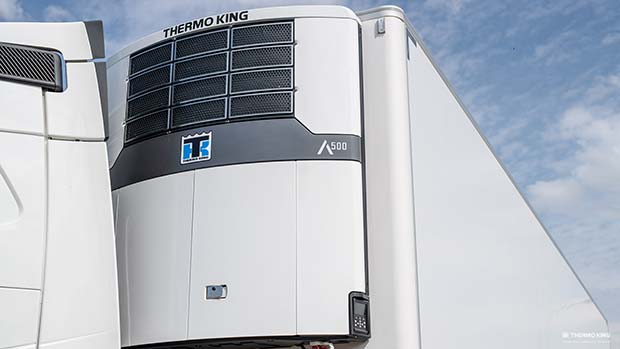David O’Gorman, Regional Director, North and Western Europe, Thermo King: By October 2022, the British government will discontinue the rebate on red diesel – the fuel of non-road machinery and refrigeration units – as part of the initiative to reduce greenhouse gas emissions.
 It’s fair to assume though, that only eliminating rebated diesel is not going to impact the environment – whether operators burn red or white diesel, they are still burning the same amount of fuel. On the other hand – choosing a sustainable refrigeration technology will. In this sense, the withdrawal of the red diesel should speed up the adoption of the more advanced, future ready transport refrigeration solutions.
It’s fair to assume though, that only eliminating rebated diesel is not going to impact the environment – whether operators burn red or white diesel, they are still burning the same amount of fuel. On the other hand – choosing a sustainable refrigeration technology will. In this sense, the withdrawal of the red diesel should speed up the adoption of the more advanced, future ready transport refrigeration solutions.
At Thermo King and Frigoblock, the hauliers have a plethora of options to prepare themselves for the future: trailer units with market leading fuel efficiencies, hybrid or 100% electric and zero-emissions refrigeration.
Staying power agnostic
Electrification and the transition of conventional architecture is a trend that is set to continue, but the industry needs to stay agile. The future does not define one, particular power source for the refrigeration systems. There is no one single fit.
To offer a sustainable choice from the customers’ business and environmental point of view, power agnostic designs seem to be the key. Following a power agnostic approach means that to deliver efficiency improvements and carbon reductions, you need to remain unbiased towards the use of any specific technologies. Refrigeration units’ power source should be adaptable to current (diesel, engine, electric) and future sustainable, alternative sources of energy, every time with maximum possible efficiency.
Thermo King is well prepared to answer that market need with our largest portfolio of zero / low-emissions solutions in all segments of the market. Frigoblock brings in proven capabilities in hybrid and non-diesel (electric) technologies offering the inverter driven technology across its all ranges of full electric refrigeration for trucks, drawbars and semi-trailers.
#FuelEfficiency – Advancer trailer refrigeration
For trailer refrigeration, the Thermo King Advancer A-Series has been designed to address and reduce fuel consumption in most of the applications that we see running in the market. Advancer is between 30 and 50 percent more fuel efficient when compared to the units we see in operation today. These savings have been validated by independent authorities like Dekra in Germany and Cambridge Refrigeration Technology (CRT) and make Advancer the most efficient trailer refrigeration system under French Energy Certification scheme.
By trading up to Advancer, hauliers take immediate advantage of Thermo King’s fuel efficiency, mitigating the expected higher costs of moving from red diesel to white. Depending on the model, they can clearly monitor the fuel consumption, with the data being recorded, displayed, and made available remotely via telematics.
To prove that, Thermo King has even made a fuel promise to pay back the difference, if the Advancer unit will not meet its fuel-saving target after the first year.
On top of that, with a modular design, Advancer offers future-ready power agnostic capabilities that can utilize diesel, axle generator, or shore power sources.
The power of hybrid
Frigoblock “alternator-driven” refrigeration systems are powered with energy generated from the truck engine via an additional three-phase alternator. Thermo King has leveraged this technology and enables hauliers operating Thermo King trailer and rigid-bodied trucks units to create a hybrid solution, by adding a Frigoblock alternator and inverter.
This gives them the ability to switch from diesel to electric when they are running into urban areas and need to reduce their emissions and/or noise level. They can also run on hybrid for the entire journey to keep their fuel consumption at the minimum.
At the end of the day, we are all in this world to make it a better place. Let’s combine technologies and cold chain solutions to help us create a better quality of life for future generations.




Comments are closed.